The 60s Bond Rivals (2): Harry Palmer
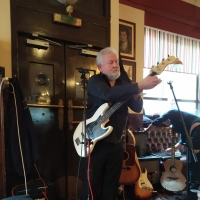 Barbel
ScotlandPosts: 36,302Chief of Staff
Barbel
ScotlandPosts: 36,302Chief of Staff
Harry Palmer
Before going any further: that isn’t his name. Len Deighton’s series of spy novels which began with The Ipcress File are told in the first person by an anonymous narrator who in the course of the stories uses several cover names (eg Edmond Dorf, Liam Dempsey) and specifically says at one point “My name isn’t Harry”. Part of the advantage to Deighton in this is that some of the books (eg Spy Story, where the agent’s cover name is Patrick Armstrong) could therefore be plausibly denied as being about the same character... though IMHO they are. Whether or not it’s accurate, for convenience I’m going to use the Palmer name here.
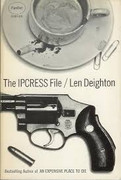
The main attraction in reading the Palmer novels is the main character and his attitudes to authority, the English class system, and the world of espionage. He’s witty, observant, and more sixties than four Beatles in a Mini. Deighton’s plots are so convoluted that they’re seemingly impenetrable at first and are set in a world of Civil Service memoranda, paper clips, committees/departments/offices at direct odds with James Bond’s environment. Palmer squabbles with his boss over expenses, gets told which desk to use by the office dragon, and gets bored filling in forms.
The Ipcress File was a huge success, leading naturally to sequels and the film rights being sought after. Those were obtained by one Harry Saltzman, a name which should be instantly recognisable to Bond fans, but why he wanted them is a story in itself.
There were many differences between Albert R. Broccoli and Harry Saltzman, but the one I find most interesting is this: once they had produced Dr No Broccoli devoted the rest of his life to filming the works of Ian Fleming* while Saltzman kept busy producing other movies such as the Harry Palmer series and The Battle Of Britain. His successes were mixed and by the mid-70s he had bankrupted himself with his non-Bond ventures.
Back to The Ipcress File. Having bought the rights, Saltzman hired director Sidney J. Furie with whom he had fallen severely out by the end of filming and to star he picked the then-rising (after his success in Zulu) Michael Caine. To this day, I cannot read Deighton’s books without picturing Caine as Palmer and hearing his voice saying the lines: it’s a superb piece of casting.
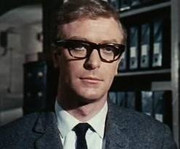
There’s an oft-told story of Caine and Saltzman deciding on a name for the anonymous character- they wanted a dull, boring name and Caine picked “Palmer” after a boring schoolmate. Saltzman agreed, and asked Caine for the most boring first name he could think of- Caine blurted out “Harry”...
The film, as with its parent novel, became a huge success as a sort of “anti-Bond” adventure, deliberately stressing the commonplace and mundane in contrast to Bond’s lifestyle. It was followed by Funeral In Berlin which is perhaps the best of the series and Billion Dollar Brain, my personal favourite. To make these three movies, Saltzman called on the services of many of the Bond team- John Barry, Maurice Binder, Guy Hamilton, Ken Adam.... the list goes on. The fourth film planned (Horse Under Water) was never made.
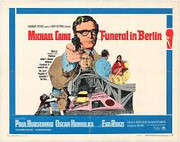
In the 70s, an independent film of Spy Story was made. Directed by Lindsay Shonteff, the budget was miniscule and the lead was played by one Michael Petrovich.
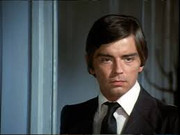
Caine did return to the role of Palmer in the 90s, in Bullet To Bejing and Midnight In St Petersburg which were pale shadows of the originals- although there is one splendid joke which I won’t spoil here, concerning the parentage of Caine’s co-star, one Jason Connery. The films were poorly promoted and Caine had problems with the producers (who wanted to sell them direct to TV while he had understood they were to have been theatrical releases).
* The sole exception was a prior commitment to a Bob Hope vehicle Call Me Bwana, filmed immediately after Dr No which today is best remembered from a poster featuring co-star Anita Ekberg which can be seen in From Russia With Love.

Before going any further: that isn’t his name. Len Deighton’s series of spy novels which began with The Ipcress File are told in the first person by an anonymous narrator who in the course of the stories uses several cover names (eg Edmond Dorf, Liam Dempsey) and specifically says at one point “My name isn’t Harry”. Part of the advantage to Deighton in this is that some of the books (eg Spy Story, where the agent’s cover name is Patrick Armstrong) could therefore be plausibly denied as being about the same character... though IMHO they are. Whether or not it’s accurate, for convenience I’m going to use the Palmer name here.

The main attraction in reading the Palmer novels is the main character and his attitudes to authority, the English class system, and the world of espionage. He’s witty, observant, and more sixties than four Beatles in a Mini. Deighton’s plots are so convoluted that they’re seemingly impenetrable at first and are set in a world of Civil Service memoranda, paper clips, committees/departments/offices at direct odds with James Bond’s environment. Palmer squabbles with his boss over expenses, gets told which desk to use by the office dragon, and gets bored filling in forms.
The Ipcress File was a huge success, leading naturally to sequels and the film rights being sought after. Those were obtained by one Harry Saltzman, a name which should be instantly recognisable to Bond fans, but why he wanted them is a story in itself.
There were many differences between Albert R. Broccoli and Harry Saltzman, but the one I find most interesting is this: once they had produced Dr No Broccoli devoted the rest of his life to filming the works of Ian Fleming* while Saltzman kept busy producing other movies such as the Harry Palmer series and The Battle Of Britain. His successes were mixed and by the mid-70s he had bankrupted himself with his non-Bond ventures.
Back to The Ipcress File. Having bought the rights, Saltzman hired director Sidney J. Furie with whom he had fallen severely out by the end of filming and to star he picked the then-rising (after his success in Zulu) Michael Caine. To this day, I cannot read Deighton’s books without picturing Caine as Palmer and hearing his voice saying the lines: it’s a superb piece of casting.

There’s an oft-told story of Caine and Saltzman deciding on a name for the anonymous character- they wanted a dull, boring name and Caine picked “Palmer” after a boring schoolmate. Saltzman agreed, and asked Caine for the most boring first name he could think of- Caine blurted out “Harry”...
The film, as with its parent novel, became a huge success as a sort of “anti-Bond” adventure, deliberately stressing the commonplace and mundane in contrast to Bond’s lifestyle. It was followed by Funeral In Berlin which is perhaps the best of the series and Billion Dollar Brain, my personal favourite. To make these three movies, Saltzman called on the services of many of the Bond team- John Barry, Maurice Binder, Guy Hamilton, Ken Adam.... the list goes on. The fourth film planned (Horse Under Water) was never made.

In the 70s, an independent film of Spy Story was made. Directed by Lindsay Shonteff, the budget was miniscule and the lead was played by one Michael Petrovich.

Caine did return to the role of Palmer in the 90s, in Bullet To Bejing and Midnight In St Petersburg which were pale shadows of the originals- although there is one splendid joke which I won’t spoil here, concerning the parentage of Caine’s co-star, one Jason Connery. The films were poorly promoted and Caine had problems with the producers (who wanted to sell them direct to TV while he had understood they were to have been theatrical releases).
* The sole exception was a prior commitment to a Bob Hope vehicle Call Me Bwana, filmed immediately after Dr No which today is best remembered from a poster featuring co-star Anita Ekberg which can be seen in From Russia With Love.



Comments
My first exposure to Palmer was through hearing the main title theme on a John Barry compilation album, and it caught my attention immediately. I used to imagine what this Ipcress film was like as I listened to this theme over and over. A couple of years later I got round to watching it, and I think my first viewing was affected by the fact that I had imagined this movie many times in my head. It was only second viewing that I really 'got it' and it became a firm favourite which I rewatched many times after that. The music, cinematography, cast, mood and dialogue all worked so well. I then watched Funeral in Berlin and Billion Dollar Brain shortly thereafter and enjoyed them both, although Billion Dollar Brain is definitely my favourite of the sequels.
A while later I read the novels of The Ipcress File and Funeral in Berlin. I did find the plot convolutions a little off-putting but the mental image of Michael Caine's 60s cool stuck with me throughout the readings. I also found a DVD of Midnight in St. Petersburg which I enjoyed more than expected although I don't think I would ever re-watch it.
I should really revisit the Deighton novels at some point. No doubt I will revisit the films many times in the future. They are gems of the 60s spy genre.
films many times. Oddly as he's 180% from Bond's life and character Palmer
is still a loveable character, and totally believable. Fancifull thinking I know but
I feel most of us would be more like Harry than James, in real life. Always trying
To get a little bit more money or trying for more expenses.
The secret service in the films ( I'm guessing the books would be the same)
always looks so run down and grubby, peeling wallpaper and thread bare carpets.
( Which apparently, was infact the case) compared to the luxury Of Bond's building.
The films had some good scripts, great music and some fine acting, The cinematography
was also amazing in places, the fight on the steps of the Albert Hall, shot through the
glass of a telephone box, for instance.
I haven't seen the two " TV movies" which followers but must make a point of watching them
sometime.
It was about an attempted invasion, to save a country. Spin forward
A few years and we have our own Prime Minister entering into a war
and regime change, all based on The same type of " sexed up" or just
Plain made up information.
It's a terrific piece of music, and one of Barry's best. His inspiration here was The Third Man* where Anton Karas's use of the zither caused Barry to use the cimbalom to build his score around.
https://www.youtube.com/watch?v=i2Jw6_Xgszk
* which has Bond connections in itself: Guy Hamilton, John Glen, and Bernard Lee all were involved. Indeed, TLD (directed by Glen) specifically homages the film.
That it does:
https://www.youtube.com/watch?v=efvhQ8kWIEY
https://www.youtube.com/watch?v=yqxVguGeguA
Yes, it's true.
Uniquely among UK/US 60s spy flicks, the Russians are the good guys here.
To touch on something Thunderpussy alluded to, I relate far more to Harry Palmer than to James Bond: his love of cooking and classical music, his rebelliousness, his style of humor, etc.
A Gent in Training.... A blog about my continuing efforts to be improve myself, be a better person, and lead a good life. It incorporates such far flung topics as fitness, self defense, music, style, food and drink, and personal philosophy.
Agent In Training
https://www.youtube.com/watch?v=HR3iWRq8ymI
A Gent in Training.... A blog about my continuing efforts to be improve myself, be a better person, and lead a good life. It incorporates such far flung topics as fitness, self defense, music, style, food and drink, and personal philosophy.
Agent In Training
Yes, the theme has clear Third Man influence. The cinematography also makes similar use of tilted camera angles. The Third Man is a great film, no. 2 on my all time favourite films list.
http://www.bfi.org.uk/news-opinion/news-bfi/features/moviegraphic-ipcress-file
Ranks to be an intelligence officer. Still has that cocky attitude ( I can relate to
that). While Bond is from an old Family, officer material from the day he was born
almost destined to work in intelligence after the war.
For me this is also a reflection of the changing face of Britain in the 60s, to use
Models and photographers as an example. Until the 60s most models came from
Fairly well off families, and in fact many photographers were " Toffs" , then came the
big change, starting with music and fashion. More working class girls became models and even some working class blokes became photographers, Some even coming from
" Up North" ( shock horror)
So I feel the two agents well reflect Britain of the 60s one, very much the traditional
Officer and gentleman. The other the new up coming generation, shaking the
Establishment tree. ( in Bond's case it was obviously a Mango tree)
.... Maybe not " The Swarm" .... but the rest is OK.
The Swarm was a great B movie
Nice find, thanks!
I hive heard that.
Do you mean Reading?
I like Len Deighton's WWII novels though I've only read Ipcress from that series and just one other "modern" novel (XPD). For me, from book to screen translated well with Michael Caine's fantastic performance, but in itself, I had a hard time visualizing Michael Caine or anyone else in the novel because of how Deighton wrote him, which reminds me of the "cypher" quality that Ian Fleming originally intended for Bond.
Because I live where it doesn't snow, I put Billion Dollar Brain on my annual winter viewing list and I love how I can actually feel Harry Palmer's shock when he first arrives in Helsinki!
I enjoyed Deightons WWII novels, but haven't bothered to read them again and again (apart from "Bomber") as I've done with the spy stories.
Dalton - the weak and weepy Bond!
You've never seen any of these films, Higgins? I'm surprised.